
Vegetable Cover Crops, Research Results to be Featured in Nov. 8, 29 Free Webinars
Two free webinars in November will highlight the results of vegetable research funded by the Northern New York Agricultural Development Program and conducted in partnership with the Cornell Cooperative Extension Eastern NY Commercial Horticultural Program.
The vegetable production research funded by the farmer-driven Northern New York Agricultural Development Program is addressing opportunities to lengthen the growing and sales seasons and to enhance soil health and farm sustainability through the use of cover crops and other best management production practices.
The one-hour webinar starting at 7 pm on Thursday, November 8, 2018, will focus on fitting cover crops into vegetable production systems. Presenters include Willsboro Research Farm Manager Dr. Michael Davis and Cornell Cooperative Extension vegetable specialists for Northern and Eastern New York Amy Ivy and Chuck Bornt. Register for the webinar through the Eastern NY Commercial Horticultural Program at https://enych.cce.cornell.edu/event.php?id=1008.
The one-hour webinar on Thursday, November 29, 2018, starting at 7 pm, will cover recent high tunnel vegetable crop research results with an emphasis on fertility for winter spinach production, the earliest warm season crops, red bell pepper varieties, and efficient pruning and training systems for pepper and cherry tomato production. Presenters will include Davis, Ivy, and Cornell Extension Vegetable Specialist Judson Reid. Online registratoin for this webinar is at https://enych.cce.cornell.edu/event.php?id=1013.
The free webinars will be offered via Zoom; participants do not need a Zoom account, but high-speed internet access by computer or smartphone is required and registration is required to receive access information. The webinars will be recorded and posted for access at a later date. For more information, contact Amy Ivy at adi2@cornell.edu, 518-570-5991.
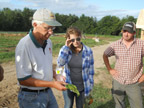 Vegetable research trials and field days in Northern New York have been hosted by farmers across the six-county NNY region and at the Cornell Willsboro Research Farm in Willsboro, N.Y.
Vegetable research trials and field days in Northern New York have been hosted by farmers across the six-county NNY region and at the Cornell Willsboro Research Farm in Willsboro, N.Y.
A Reduced Tillage Field Day Handbook with tips for improving soil health in both organic and convention vegetable, row crop and small grain systems is available free in the Horticulture: Vegetables section of the Northern New York Agricultural Development Program at www.nnyagdev.org. The handbook is based on a field day event sponsored by the Northern New York Agricultural Development Program, New York Soil Health, and Lake Champlain Basin Program and coordinated by the Cornell Cooperative Extension Eastern NY Commercial Horticulture Program, CCE Essex County, and the Cornell Willsboro Research Farm.
Farmers and farm advisors from Clinton, Essex, Franklin, Jefferson, Lewis and St. Lawrence counties provide input to drive the development of targeted research that responds to high priority opportunities and challenges for farms of all sizes and interests. A farmer committee ranks and selects projects for grants from the Northern New York Agricultural Development Program. Project leaders range from faculty with Cornell University, the State University of New York, Miner Institute to Cornell Cooperative Extension specialists and agricultural industry representatives.
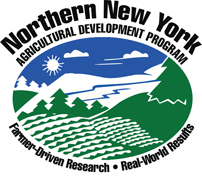
Funding for the Northern New York Agricultural Development Program is supported by the New York State Senate and administered by the New York State Department of Agriculture and Markets.
 10/30/18 At the end of this article: see responses to two inquiries from readers about this research.
10/30/18 At the end of this article: see responses to two inquiries from readers about this research.
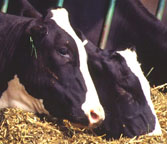 With grants from the Northern New York Agricultural Development Program and other funders, Ketterings and her team have developed feasible mass balance ranges for New York dairy operations, based on actual balances from commercial dairy farms in New York. Farms operating outside the optimal operational zone most likely have opportunities to improve their nutrient use efficiency.
With grants from the Northern New York Agricultural Development Program and other funders, Ketterings and her team have developed feasible mass balance ranges for New York dairy operations, based on actual balances from commercial dairy farms in New York. Farms operating outside the optimal operational zone most likely have opportunities to improve their nutrient use efficiency.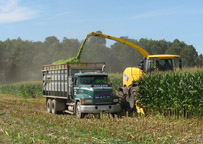
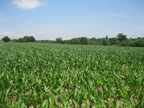
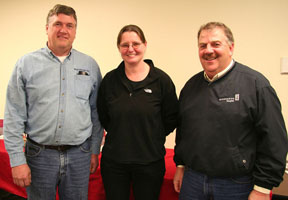
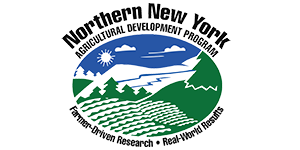 This regional research funded by the Northern New York Agricultural Development Program is part of a statewide effort.
This regional research funded by the Northern New York Agricultural Development Program is part of a statewide effort.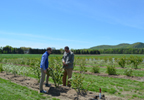
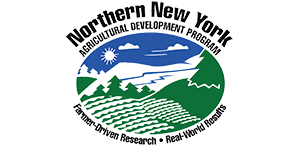 Lowville, N.Y.; September 18, 2018. The Northern New York Agricultural Development Program (NNYADP) has posted its 2019 grant application, research ideas, and guidelines on the home page at
Lowville, N.Y.; September 18, 2018. The Northern New York Agricultural Development Program (NNYADP) has posted its 2019 grant application, research ideas, and guidelines on the home page at